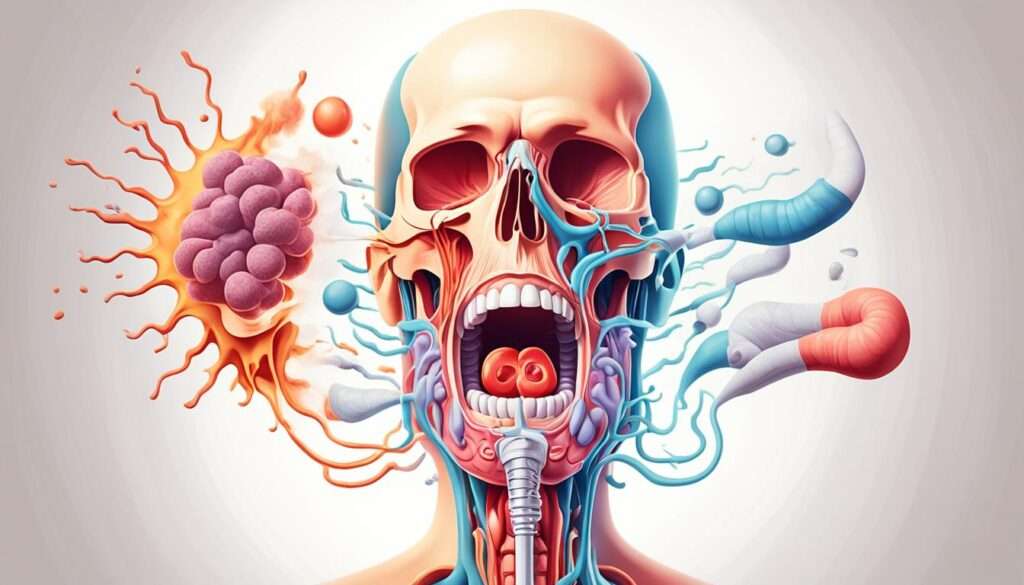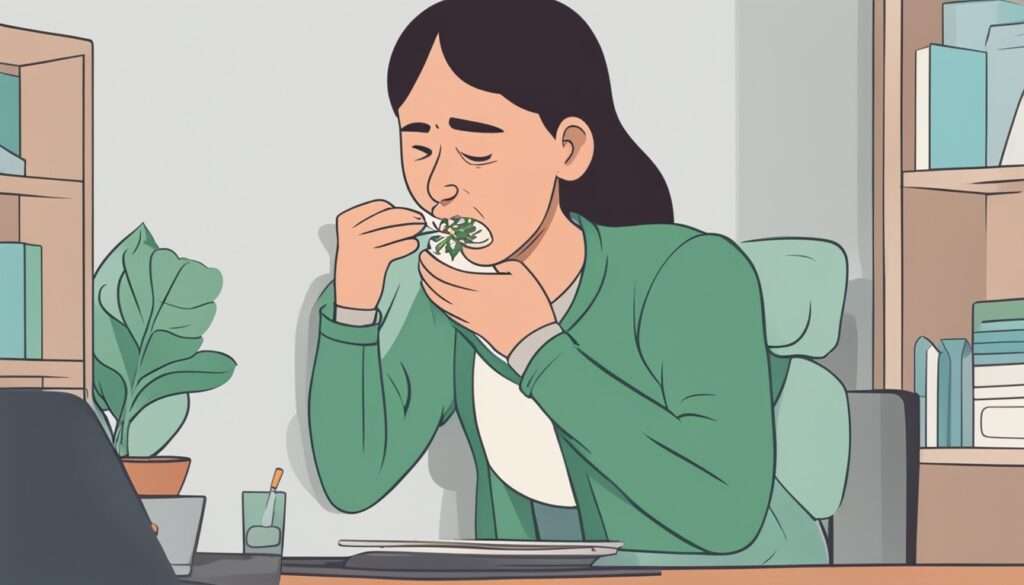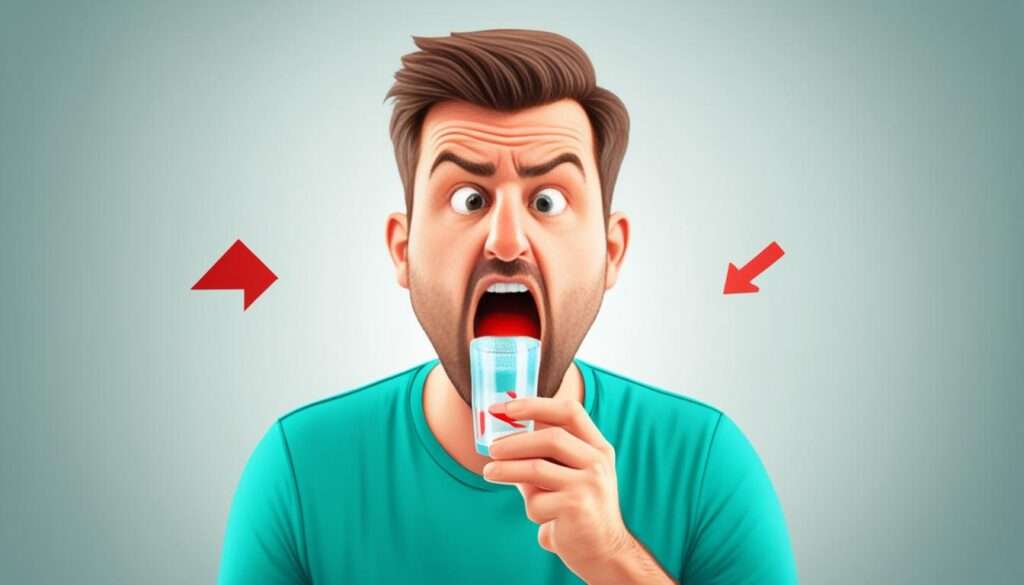|
Getting your Trinity Audio player ready... |
Are you dealing with bad breath that won’t go away? You might be surprised to find that GERD could be the cause. GERD is a condition where stomach acid moves back into the esophagus. This can lead to heartburn, regurgitation, and bad breath.
Table of Contents
ToggleGERD is not just occasional acid reflux. It’s a serious condition that affects your health and life quality. The National Institute of Diabetes and Digestive and Kidney Diseases (NIDDK) says obese people are more likely to be hospitalized for GERD.
Many know about GERD symptoms like heartburn and regurgitation. But the link to bad breath is often missed. PPIs are often given to treat GERD. Yet, GERD can cause chronic cough, asthma, laryngitis, hoarseness, and tooth enamel erosion.
This article will look into how GERD and bad breath are connected. We’ll give you the info and tips you need to fight this symptom of GERD.
What is GERD and How Does it Cause Bad Breath?
GERD, or gastroesophageal reflux disease, is a condition where stomach acid goes back into the esophagus. This leads to heartburn, regurgitation, and other symptoms. Bad breath, or halitosis, is a side effect of GERD. It happens when stomach acid and food come back up into the mouth, making a bad taste and smell.
Understanding the GERD-Bad Breath Connection
The muscle between the stomach and esophagus, called the lower esophageal sphincter, gets weaker or relaxes too much. This lets stomach acid flow back into the esophagus. This acid irritation causes heartburn and regurgitation, but it can also go into the mouth.
This acid in the mouth makes a sour taste and bad breath. It can also cause problems with oral health, like tooth enamel erosion and dental cavities. Good oral hygiene and treating GERD are key to managing bad breath and other issues.

The Role of Acid Reflux in Bad Breath
Ever had a sour taste in your mouth with bad breath? That might be acid reflux, or gastroesophageal reflux disease (GERD). This happens when stomach acid and food move back up into the esophagus. It can cause bad breath among other symptoms.
When stomach acid and food move back up, they can make your mouth taste sour and smell bad. This leads to bad breath, or halitosis. The acid and food particles have compounds that smell bad when they touch your mouth and tongue.

Acid reflux can also harm your teeth and increase cavity risk. These issues can make bad breath worse, creating a tough cycle to overcome.
If you have ongoing bad breath and think it’s from acid reflux, see a doctor. They can figure out why you have bad breath and help you manage your GERD symptoms. This can also improve your oral health.
Other Causes of Bad Breath in GERD Patients
GERD, or gastroesophageal reflux disease, is the main cause of bad breath. But, there are other factors that can make it worse. Knowing these can help you manage your breath better and keep your mouth healthy.
Dry Mouth
GERD can make you produce less saliva, leading to a dry mouth. Saliva helps wash away food bits and neutralize acids that cause bad breath. Without enough saliva, bacteria can grow, making your breath smell bad.
Bacterial Overgrowth
GERD patients often have more bacteria in their small intestine. This can make volatile sulfur compounds that smell bad. This condition, called small intestinal bacterial overgrowth (SIBO), makes GERD breath worse.
Certain Foods and Medications
Some foods and medicines for GERD can also affect your breath. Foods like garlic and onions, and some medicines like antidepressants and antihistamines, can dry out your mouth. This can lead to bad breath. Being aware of how your food and medicine choices affect your breath is key.
Knowing what causes bad breath in GERD can help you fight it. Talking to your doctor can help find the right solutions for your GERD and bad breath.
Diagnosing GERD and Bad Breath
If you have bad breath that won’t go away, and you think GERD might be the reason, you should see a doctor. Getting to the bottom of why you have bad breath is key to fixing it.
Your doctor will start by asking you about your health history and symptoms. They might also do a physical check-up. Then, they could suggest some tests to help figure out what’s going on.
- Endoscopy: This is when a thin tube with a camera on it goes down your throat to look at your esophagus and stomach for GERD signs.
- pH monitoring: This test checks the acid level in your esophagus over a day to see if you have GERD.
- Manometry: This test looks at how strong and well your esophagus muscles work to find out if they’re causing problems.
- Barium swallow: This X-ray test shows how food and liquids move through your esophagus.
By looking at the test results, your health history, and your symptoms, your doctor can see if GERD is causing your bad breath. They can then make a plan to help you.

Remember, GERD is just one reason for bad breath. Other things like poor dental care, too many bacteria, or certain medicines could also be the cause. Your doctor can find out what’s really causing your bad breath and help you get rid of it.
Lifestyle Changes to Manage GERD and Bad Breath
If you’re dealing with GERD (gastroesophageal reflux disease) and bad breath, there are steps you can take. Making lifestyle changes can help manage your GERD and improve your breath. By focusing on the causes of your GERD, you can also reduce bad breath.
Dietary Adjustments
Start by identifying and avoiding foods that trigger your GERD. Foods like spicy, fried, or acidic ones, and drinks with carbonation or alcohol can make things worse. Keeping a food diary can help you see which foods are the culprits.
Weight Management
Keeping a healthy weight is key to managing GERD and bad breath. Being overweight can put pressure on your stomach, causing acid to flow back up. Work on losing weight slowly and safely through a balanced diet and regular exercise.
Quit Smoking
Smoking can make GERD and bad breath worse. Quitting can help ease your GERD symptoms and improve your breath. Talk to your doctor about resources and support to help you quit smoking.
Stress Management
Stress can make GERD and bad breath worse by increasing stomach acid and tightening your digestive muscles. Try stress-reducing activities like meditation, yoga, or deep breathing. These can help ease your GERD symptoms and keep your breath fresh.

Medications for Treating GERD and Bad Breath
If lifestyle changes and natural remedies don’t work for you, medications can help. There are both over-the-counter and prescription options. They can reduce acid reflux and its bad smell.
Over-the-Counter Medications
Antacids like Tums, Rolaids, and Maalox can quickly ease symptoms. They either coat your esophagus or cut down on acid. But, they don’t fix the root cause of GERD.
Prescription Medications
For long-term GERD and bad breath relief, your doctor might suggest stronger meds. H2 blockers (Pepcid, Zantac) or proton pump inhibitors (Prilosec, Nexium, Prevacid) can help. They either lower acid production or stop acid reflux.
It’s key to work with your healthcare provider to find the right medication for you. The right mix of meds and lifestyle changes can help control your GERD and bad breath.

Natural Remedies for GERD and Bad Breath
If you’re facing the issue of bad breath due to gastroesophageal reflux disease (GERD), you might find some natural remedies helpful. Ginger, apple cider vinegar, and aloe vera could ease GERD symptoms and improve your breath.
Ginger is famous for its anti-inflammatory effects. These can lessen the irritation from acid reflux. You can add fresh ginger to your food or drink ginger tea.
Apple cider vinegar is thought to balance your stomach’s pH levels. This might cut down the acid that flows back into your esophagus. Mix a tablespoon of apple cider vinegar with water and drink it before meals.
Aloe vera is another option for GERD relief. Its soothing and anti-inflammatory qualities can ease esophagus irritation. You can drink aloe vera juice or apply aloe vera gel to your mouth to freshen your breath.
But remember, while these natural remedies might help, it’s wise to talk to a healthcare professional first. They can guide you on the best treatments, especially if you have a chronic condition like GERD. They ensure the remedies you try are safe and right for you.

gerd and bad breath
If you’re dealing with persistent bad breath, it could be linked to a common condition known as gastroesophageal reflux disease (GERD). GERD is a chronic digestive disorder where stomach acid flows back into the esophagus. This causes a range of unpleasant symptoms, including bad breath.
The connection between GERD and bad breath is rooted in how GERD affects your body. When stomach acid and partially digested food travel back up into your esophagus and mouth, they can leave an unpleasant, sour taste and odor. This leads to halitosis, or chronic bad breath.
In addition to acid reflux, other factors can contribute to bad breath in GERD patients. These include:
- Dry mouth, which can allow bacteria to thrive and produce foul-smelling compounds
- Bacterial overgrowth, often caused by the disruption in the balance of oral bacteria
- Certain foods and medications that can exacerbate GERD symptoms and bad breath
If you suspect your bad breath is related to GERD, it’s important to work with your healthcare provider. They can help diagnose and manage your condition. With the right treatment approach, you can find relief from both GERD and the associated bad breath.

Dental Care for GERD Patients with Bad Breath
If you have gastroesophageal reflux disease (GERD) and bad breath, good dental care can help. Regular brushing, flossing, and using an antibacterial mouthwash can fight the bad smell.
Brushing and Flossing: Your Allies Against Bad Breath
Brushing and flossing are key for GERD patients with bad breath. Brushing your teeth twice a day removes food and bacteria that cause bad breath. Flossing gets rid of trapped food and plaque, which also helps fight bad breath.
The Power of Antibacterial Mouthwash
Using an antibacterial mouthwash can also help with GERD-related bad breath. These mouthwashes kill bacteria in your mouth, reducing the smell. Always use it after brushing and flossing as directed.
When to Seek Medical Attention for GERD and Bad Breath
If you’re dealing with persistent 12 and worry about its link to your 12, getting medical help is key. While making lifestyle changes and trying home remedies can help, some cases need a doctor’s care.
Consider seeing a healthcare provider if:
- Your 12 is severe or getting worse, with lots of heartburn, trouble swallowing, or unexplained weight loss.
- Over-the-counter meds don’t help your 12 much.
- Your 12 comes with other worrying signs, like chest pain, trouble breathing, or constant hoarseness.
- You have a family history of 12 or similar issues, which might up your risk.
- Your 12 lasts over two weeks even after you’ve changed your habits.
Your doctor will do a full check-up, possibly including tests like an endoscopy or pH monitoring. This will help figure out what’s causing your 12 and create a treatment plan. Getting help early can stop serious problems and make sure you get the care you need for your 12.
Your health and happiness are most important, so don’t wait to get professional advice if your 12 keeps bothering you. Working with your doctor can help you find the best ways to tackle the cause of your 12 and better your life overall.
Managing GERD and Bad Breath During Pregnancy
Pregnancy is a time of joy, but it also brings health challenges. Many expectant mothers face issues like GERD and bad breath. Luckily, you can manage these problems with the right precautions and treatments. This way, you can keep your mouth healthy during pregnancy.
Precautions for Pregnant Women with GERD and Bad Breath
As your body changes during pregnancy, you might get GERD more easily. To fight GERD and bad breath, follow these tips:
- Avoid foods that can make reflux worse, like spicy, fried, or acidic ones.
- Eat smaller meals often to ease your digestive system’s load.
- Stay upright for 2-3 hours after eating to stop stomach acid from coming back up.
- Use stress-management techniques to help with GERD symptoms.
- Drink lots of water to stay hydrated.
Treatments for GERD and Bad Breath During Pregnancy
Before taking any medicines for GERD or bad breath, talk to your healthcare provider. They can suggest safe and right treatments for you and your baby. These might include:
- Antacids to neutralize stomach acid and ease heartburn and acid reflux.
- H2 blockers to cut down stomach acid production and lessen GERD symptoms.
- Proton pump inhibitors to block acid production and heal the esophageal lining.
- Natural remedies like ginger, chamomile tea, or aloe vera, but check with your healthcare provider first.
By taking action and working with your healthcare team, you can handle GERD and bad breath during pregnancy. This ensures your oral health stays good during this important time.
Conclusion
The link between GERD (gastroesophageal reflux disease) and bad breath is complex. It needs a full approach to understand and manage. By knowing the causes, like acid reflux and other factors, you can fight both GERD and bad breath.
Changing your lifestyle, using medicine, and good dental care can help. These steps can tackle the main causes of bad breath from GERD. This way, you’ll not only breathe better but also boost your overall health.
Keep an eye on your health and work with your doctors. Don’t be shy to ask for expert advice. With the right methods, you can control your GERD symptoms and feel confident with fresh breath. Take action for your oral and digestive health for a better life.
FAQ
What is GERD and how does it cause bad breath?
GERD, or gastroesophageal reflux disease, is a condition where stomach acid flows back into the esophagus. This causes heartburn, regurgitation, and other symptoms. Bad breath, or halitosis, is a lesser-known symptom of GERD.
How does acid reflux contribute to bad breath?
Acid reflux brings stomach acid and partly digested food back up into the esophagus and mouth. This can cause an unpleasant taste and smell, leading to bad breath.
What other factors can contribute to bad breath in GERD patients?
Besides acid reflux, bad breath in GERD patients can come from dry mouth, bacterial growth, and certain foods and medicines.
How can dietary and lifestyle changes help manage GERD and bad breath?
Changing your diet and lifestyle can help with GERD and bad breath. Avoid trigger foods, lose weight, quit smoking, and manage stress to help.
How can medications help treat GERD and bad breath?
Medications like antacids, H2 blockers, and proton pump inhibitors can reduce acid reflux and bad breath symptoms.
What natural remedies may help with GERD and bad breath?
Natural remedies like ginger, apple cider vinegar, and aloe vera might help with GERD and bad breath. But, talk to a healthcare professional before trying them.
How can good dental hygiene help with bad breath related to GERD?
Good oral hygiene, including brushing, flossing, and mouthwash, can fight bad breath caused by GERD.
How can GERD and bad breath be managed during pregnancy?
Pregnant women often get GERD and bad breath. Taking special precautions and treatments can help during pregnancy.
Source Links


